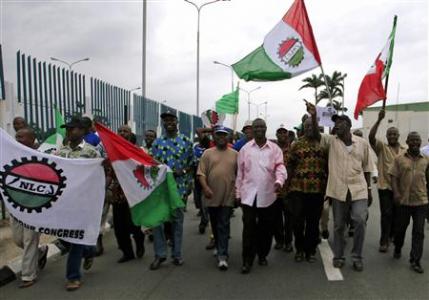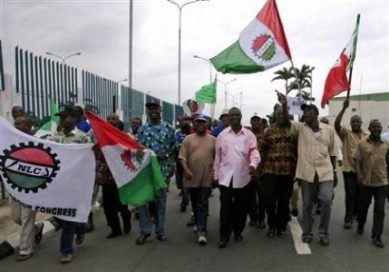National Issues
Where are the Trade Unions? -By Josef Omorotionmwan


One permanent feature that has remained with most Nigerian workers is the pay-day ordeal. Except the few who get something by the side, for most workers, the pay-day – supposedly the day of reward for the worker’s efforts in the past one month – instead of being his happiest day turns out the saddest.
The pay-packet has just been delivered to him, or in the more modern way, the credit alert for his salary has just been sent from his bank. His children’s school fees are automatically a front-line charge. The house rent must be paid. The “exercise book arrangement” – those small-small credits from neighbourhood stores – must be settled. And then, transport, travelling, and utility bills must be settled.
In the accounting profession, these fixed charges are classified as uncontrollables. After the worker settles these, he finds that his account is already in deep red. He is sad and sometimes, he begins to think that he would have been better off, not working at all. But life must continue. So, he quickly sets the borrowing cycle in motion again.
Today, the Nigerian worker has a multiplicity of problems but no one is listening to him. A situation where the purchasing power of the Naira has totally capitulated to inflation; a situation where over 87% of Nigerians live on less than N184 or about $0.47 per day; and where life expectancy has fallen to 47years from the 60 years at independence in 1960, is contemptible, to say the least.
The much-talked-about N18,000 per month minimum wage translates to less than $50 by today’s exchange rate. This means that the worker’s take-home pay cannot even take him to the next bus-stop.
Where, then, are the trade unions? Last November, it took some non-conformist state governors’ decline of the payment of the menial wage to remind the unions that an upward review of that menial wage has been long over-due. Put simply, the unions are defective even in the basic task of fighting for their members’ welfare.
In the more civilised climes, the role of trade unions transcends the picket-lines. Even more important than organising strikes, their functions include researching into strategies for avoiding strikes. Trade unions should be society’s watch-dog, constantly keeping all institutions of government and the organised private sector on their toes. The unions should organise themselves into an alternate-government, with a viable department that would, for instance, pick up the annual budget of the federal government, take it apart; and reassemble it to suit the interest of the generality of Nigerians.
Quite frankly, unionism in Nigeria has not always been as docile as it is today. Unionism emerged to curb the excesses of Nigerian politicians right from independence. Unions fought against anti-people policies, high-handedness of the government, particularly the military regimes, corruption and insensitivity of the political elite to the plight of the suffering masses.
Labour movements properly articulated the aspirations of the masses in society, raised their political consciousness; and mobilised public sentiments against the abuses of the ruling class. Unions were in the vanguard of the nationalist movement, which eventually led to Nigeria’s independence and the total emancipation of the Nigerian state.
Labour also raised fundamental questions on education, health and other social services. It constantly challenged authoritarian tendencies wherever they existed.
In those days, when Michael Imoudu sneezed, government caught cold. We still remember very vividly that fateful day in 1963, when we were holidaying in Lagos. We watched from a storey building at Idumota Square as Imoudu, under the scorching sun, followed by the workers – all totally immersed in cold sweat. The march started from Hebert Macaulay Street, Yaba and they headed for Parliament Buildings, Tafawa Balewa Square, where they held up parliamentary proceedings. That was how the union forestalled the plan of then Tafawa Balewa administration to turn Nigeria into one-party state after abolishing official opposition.
There is, though, no escaping the inevitable conclusion that no organisation can ever grow much higher than the environment in which it exists. Workers must necessarily form opinion of their unions based on the life-styles of their leaders.
As we speak, the Nigerian Labour Congress, NLC, shamelessly parades parallel national executives. This is clearly a mirror-image of the larger Nigerian society. In the past, leadership of the NLC was a call to duty, a call to service but today, it is a call to ostentation and very soon, who knows?, it may become a call to the ownership of a private jet. Why would such not abandon their duty posts and pursue wealth?
The principle of fair-hearing also demands that we hear out the trade unions on all sides. The plight of the trade unions leadership in Nigeria has been pathetic. They didn’t get to this sorry state by sprint. Violence against trade unionists has been endemic. We are talking or murder, disappearance, intimidation, torture, harassment and detention, sometimes for years, without charges and without trial.
For instance, Milton Dabibi, General Secretary of PENGASSAN, as he then was; and Frank Kokori, General Secretary of NUPENG, as he then was, were detained in 1994 and 1996 respectively for upwards of two years without trail and even when their health deteriorated, they were denied access to medication. We lost count of the number of times the former NLC President, Adams Aliyu Oshiomhole, was arrested and detained.
That’s how Labour was decapitated virtually unto its comatose state, no thanks to the military authoritarianism. In the process, some unionists went underground and became extinct. Some migrated to the comfort zone where they are today.
In all, the unionists were not alone in the military brutality. Journalists were not spared, either. Dele Giwa didn’t live to tell his story. Tunde Thompson and Nduka Irabor were luckier that they only served long prison terms.
The unions must come out of their shells because when the chips are down, history will only be interested in their achievements – not how long they were in the trenches.
Certainly, we shall overcome someday!
International Women’s Day: The Sen. Ali Ndume challenge
THE 8th of March is celebrated all over the world as International Women’s Day. For those who might not know, the celebration is directly related to advocacy by Clara Zetkin (1857-1933) the German Marxist theorist and activist. She was a pioneer fighter for women’s rights, equal opportunities for women as well as women’s sufferage.
She led the fight for the adoption of an International Women’s Day, to commemorate the contributions of working women to the advancement of humanity. Today, even bourgeois circles as well as neocolonial elites, including those in Nigeria have come to accept an International Women’s Day, as commemorative of the place of women in society.
Well, this week, Clara Zetkin entered Nigeria’s “Distinguished” Senate, through the car park (in a manner of speaking, since Senate President, Bukola Saraki, had confessed that he was hiding inside a car in the car park the night before he seized senate in June 2015!). While contributing to a debate on a motion to celebrate International Women’s Day,
Senate Leader, Ali Ndume requested Nigerian men to marry more than one wife in order “to show care for women”. Ndume asked men to marry more wives as a way of taking care of them: “I urge men to marry more wives as a way of taking care of them”. The Senate Leader was deadpan serious in his request: “Men should take care of women by not just befriending them, but by going further to marry them. I know there is nowhere in the Bible that prohibits marry more than one wife”.
One man, many wives
Ndume then addressed Bukola Saraki: “Starting with the senate president I ask him to consider marrying more than one wife”. He then made a formal request to the Senate, urging it to declare that Nigerian men should marry more than one wife: “As a sign of respect for women, let’s urge men to marry more than one wife”; a motion that was seconded by Suleiman Nazif, representing Bauchi North Senatorial District.
The original motion about International Women’s day had been moved by Oluremi Tinubu, who paid tribute to Nigerian women: “We represent courage and resilience (and) without us I don’t think this country will move forward”.
Tinubu’s serious note seemed to have been outflanked by Ndume’s ambushing tactic and the motion for men to marry more than one wife. But Binta Garba (APC Adamawa) offered Ali Ndume a riposte: “We are not sex objects. Bible is in support of one man, one woman. We want gender parity. Where women and men work side by side”.
As for the motion seeking Nigerian men to marry more than one wife, well, it failed; because Bukola Saraki ruled that: “the NAYS have it”! Smart man, he won’t have to face Toyin’s wrath! What would Clara Zetkin have felt about Senator Ali Ndume’s request for Nigerian men to marry more wives, “as a sign of respect for women”?! If you wait long enough, everything changes, even inside Nigeria’s Senate.
The distance from hiding inside a car park to seeking more wives for Nigerian men is not as long as it took Clara Zetkin to help set out an International Women’s Day. If in doubt ask our “Distinguished” Senators!



















